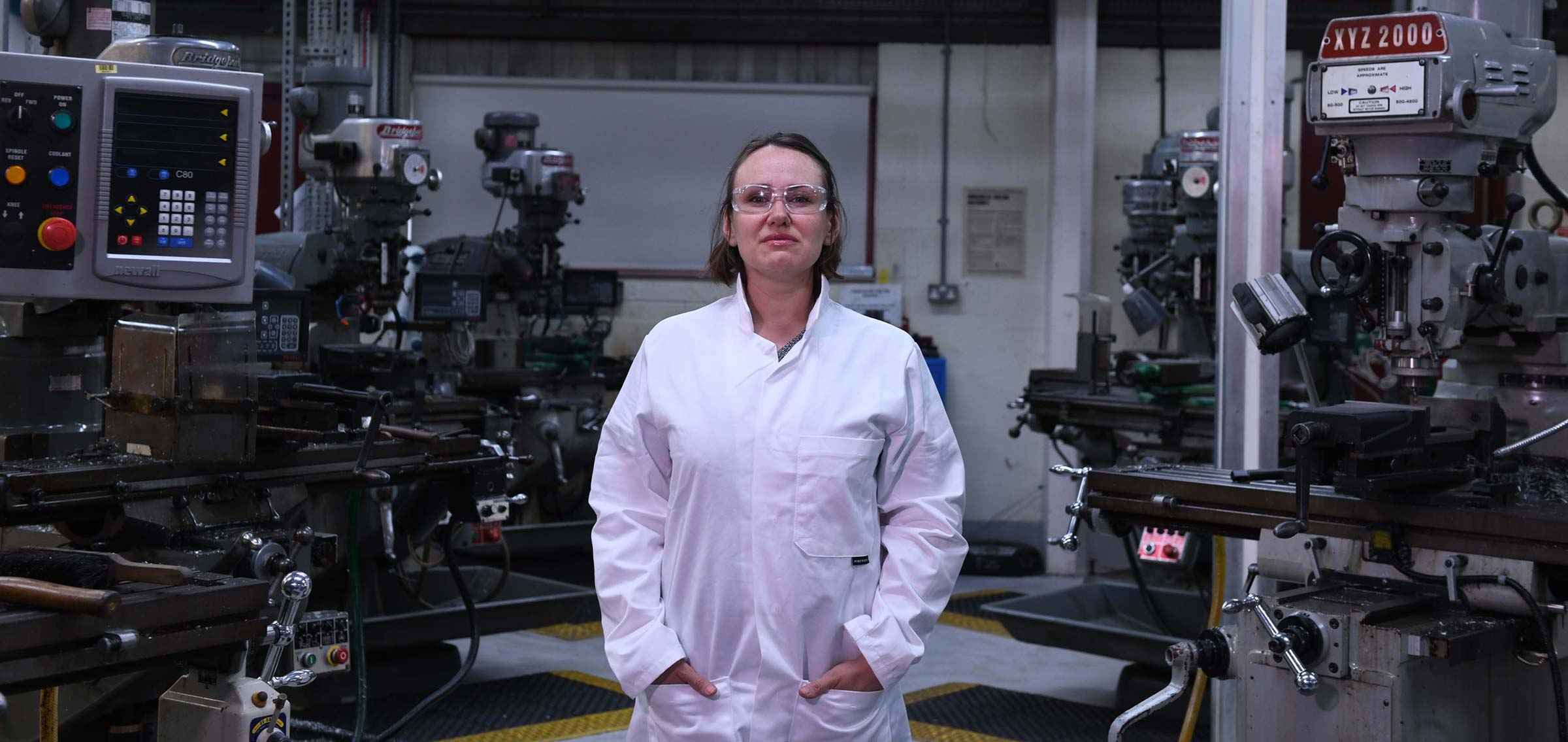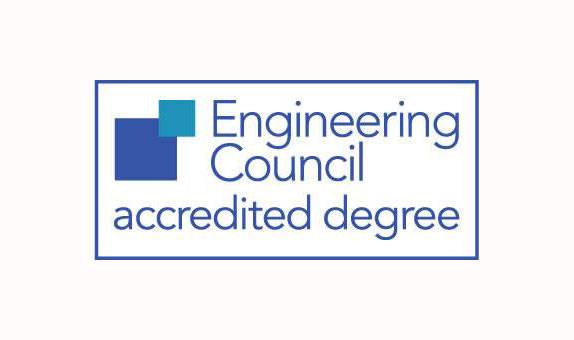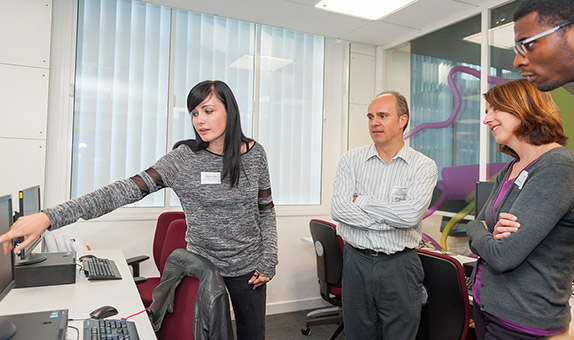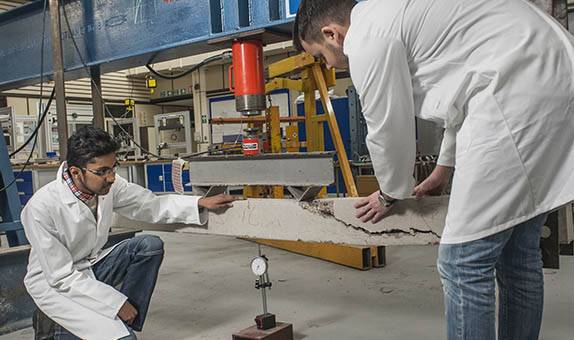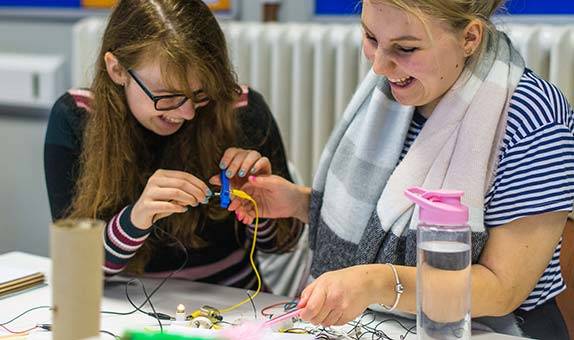Engineering Projects & Systems Management MSc
Why choose this course?
Many engineering companies to date operate on a global business platform, and many are constantly driven by new initiatives such as new products, projects or services to sustain their business growth. Thus, engineering graduates who are equipped with both technical and management skill sets are particularly sought after.
This course, accredited by the Institution of Mechanical Engineers (IMechE), provides an excellent opportunity to improve your current technical portfolio with a spectrum of engineering operations and project management skills. As a result, you will enhance your employment prospects and your ability to apply for senior engineering management roles.
You will examine the elements of a successful engineering business and how to find solutions to critical engineering management problems. Using management techniques and resource optimisation, you will be able to boost operations, productivity and competitiveness.
You will learn to develop and manage projects effectively and use e-commerce and IT to expand a business. Activities include interactive lectures, problem-based learning, laboratory work, team building and case studies. Through an individual project, you will gain expertise in a chosen field to suit your career.
| Mode | Duration | Start date |
|---|---|---|
| Full time | 1 year | September 2024, January 2025, September 2025 |
| Full time | 2 years including professional placement | September 2024, January 2025, September 2025 |
| Part time | 2 years | September 2024, January 2025, September 2025 |
| Main Location | Roehampton Vale |
Reasons to choose Kingston University
- This course meets the exemplifying academic benchmark requirements for registration as a chartered engineer. So if you have an accredited BEng (Hons), this MSc will fulfil the overall educational base for Chartered Engineer (CEng) registration.
- Industry speakers will keep you up to date with challenges and developments in the real world.
- You will use specialist software in operation management, quality analysis, business decision modelling, supply change management and resources simulation.
Accreditation
Accredited by the Institution of Mechanical Engineers (IMechE) on behalf of the Engineering Council as meeting the requirements for Further Learning for registration as a Chartered Engineer. Candidates must hold a CEng accredited BEng/BSc (Hons) undergraduate first degree to comply with full CEng registration requirements.
The MSc will meet, in part, the academic benchmark requirements for registration as a Chartered Engineer. Accredited MSc graduates who also have a BEng(Hons) accredited for CEng, will be able to show that they have satisfied the educational base for CEng registration.
It should be noted that graduates from an accredited MSc programme, who do not also have an appropriately accredited honours degree, will not be regarded as having the exemplifying qualifications for professional registration as a chartered engineer with the Engineering Council; and will need to have their first qualification individually assessed through the individual case procedure if they wish to progress to CEng.
- Further learning details are available on the Institution of Mechanical Engineers website
- All accredited degrees are displayed on the Institution of Mechanical Engineers website
Accreditation is a mark of assurance that the degree meets the standards set by the Engineering Council in the UK Standard for Professional Engineering Competence (UK-SPEC). Some employers recruit preferentially from accredited degrees, and an accredited degree is likely to be recognised by other countries that are signatories to international accords.
Please check the Engineering Council website for more information.
What you will study
You will learn how to apply advanced project management and resource optimisation skills, and will be able to identify, evaluate and recommend solutions to critical engineering management problems that need improvement. You will study the important ingredients of running a successful business, and how to improve its operations, productivity and competitiveness by using different management techniques specific to engineering companies. You will be able to develop and manage new projects more effectively and within the given constraints in functions, cost and time. You will also learn how to expand your business through using the latest e-commerce and IT techniques.
Throughout the course you will have many hands-on sessions to practise what you have learned in the classroom. You will gain practical skills through using specialist software in operation management, quality analysis, business decision modelling, supply chain management and resources simulation. The project dissertation will allow you to develop a chosen field of knowledge which will complement your career ambition. Teamwork, group presentations, case studies and industrial speakers are other highlights of the course, enhancing your learning experience and employability.
Your MSc project will give you the opportunity to further specialise in a chosen field. We provide careful consultation to make sure you choose the right project topic (from a wide-ranging list) for your career ambitions. Many projects are company-oriented, which means that you have the opportunity to deal with real-world problems in your chosen subject.
For a student to go on placement they are required to pass every module first time with no reassessments. It is the responsibility of individual students to find a suitable paid placement. Students will be supported by our dedicated placement team in securing this opportunity.
Modules
Professional placement
Core modules
Engineering Projects and Risk Management
15 credits
Risk management is crucial in engineering projects as it anticipates potential uncertainties, allowing proactive planning and resource allocation. It enhances decision-making, maintains project schedules, and prevents budget overruns. Effective risk management instils stakeholder confidence and ensures project quality. By addressing risks early, teams can implement mitigation strategies, optimise resource use, and improve long-term project viability.
This module comprehensively addresses the process of engineering project management and risk analysis. You will gain insight into project lifecycle stages, risk identification and assessment, mitigation strategies, communication, stakeholder management, project monitoring, reporting, and technological integration for effective risk management. Upon completion, you should be well-equipped to lead successful engineering projects while proactively managing potential risks.
Industrial Operations Management
15 credits
This module explores the various management techniques commonly used in the industrial sector to improve its operational efficiency, overall productivity, and global competitiveness. You will gain an in-depth understanding of how these operational challenges are being tackled and managed by engineering companies worldwide, and case studies will be used to gain further insight of how advanced operations management techniques are implemented by these companies in order to improve their overall business performances.
The module content covers both strategic and operational issues including plant location, supply chain management, distribution logistic, customer service process, production capacity planning and control, inventory management, quality control, productivity and performance measurement, materials handling, equipment maintenance policies, etc.
Engineering and Business Resource Management
15 credits
This module focuses on using advanced management techniques, including simulation and business modelling, in an engineering company to maximise the utilisation of its finite resources in order to become more competitive. These techniques include discrete event simulation, business modelling, linear programming, and human resources optimisation, with the main aim to improve the company's overall operational efficiency, competitiveness and profit.
The intended module topics cover both local and global horizons of running a successful business by teaching companies they may benefit from using simulation techniques in streamlining their operations and resource deployment through a benchmarking process. Through extensive hands-on practical, you will learn how to use sophisticated simulation software to improve resources utilisation in different business scenarios.
Throughout the module, you will learn not only the theoretical techniques of management skills, but also to apply the knowledge you gain and evaluate the results through developing complex business simulation models, therefore enhancing your employability potentials.
Integrative Operations Project Management
30 credits
The Integrative Operations Project Management module is a practical, project-oriented module. It allows you to work in a group in a stimulating and creative environment, and to make use of the learning and competencies you have developed throughout your studies. Its objective is to enable you to participate in an independent research/review on a chosen topic within your subject area that suits your learning purpose and need. You are also expected to implement the project under the guidance of your supervisors to ensure you develop experiences in integrating the different knowledge and skills which you acquired from various subjects in the programme for the purpose of advancing your professional scholarship and competence in the related fields of practice.
Through successful completion of this module, you will deliver a tangible project outcome and simultaneously secure deeper conceptual and practical understanding, as well as develop your applied competencies at the intersection of operations, business, and project management knowledge, thus enhancing your employability.
Research Techniques, Innovation and Sustainability
30 credits
Research Techniques, Innovation and Sustainability equips you with the skills and knowledge required to select and justify a research topic and then to plan and execute that research project. Research is a broad topic covers a variety of activities that range from undertaking a project as part of an academic programme, through research and development in the commercial environment, to acquiring information to inform projects undertaken as part of routine business practice. This module introduces research in these contexts and allows you to develop your own research plan. As part of the module, you will consider setting research questions and determining hypotheses, acquire relevant information and data, apply suitable analytical techniques, and evaluate the significance and potential applications of their research findings. You will also develop your innovation skills through a combination of workshops and team working, resulting in submission of an innovation proposal aimed to address UN Sustainable Development Goal 11, Sustainable Cities and Communities.
The module covers many practical aspects surrounding research in the commercial environment including intellectual property and professionalism, and sustainability is embedded throughout the module both in course content and via development of the innovation proposal.
Dissertation
60 credits
Drawing on previous knowledge and experience, the dissertation module allows you to study an area of interest within your chosen field in significant depth. In undertaking the dissertation, you will develop not only a deeper understanding of your subject area but will also be able to demonstrate a high level of autonomy in terms of project dissertation planning and management. You will be able to demonstrate knowledge and competence in reviewing existing published literature and data and, through your own efforts, apply one or more of a range of research methods to collect and analyse data and draw well-founded conclusions as a result of your research. The main output from the module is a final report but the option is available for you to prepare their work in the format of an article suitable for submission to a relevant conference or journal.
Option modules
Quality Management Systems
15 credits
To ensure that products and services have the quality they have been designed for, a quality strategy throughout the organisation is required. This approach to the management of quality throughout the entire organisation has evolved to what is generally known as Quality Management Systems (QMS). The focus of this module is to inform students about the fundamental principles of QMS and its implementation using various tools and techniques.
This module will start off with an overview of QMS with an emphasis on ISO 9000 series, which is a key building block in an organisation's approach to total quality management (TQM) and strategic process improvement (SPI). This will lead to the next topic which is the selection of tools and techniques, and the typical problems found in their use and applications. The final part of this module will cover key concepts of specific quality management techniques such as quality function deployment (QFD), design of experiments (DoE), failure mode and effects analysis (FMEA), statistical process control (SPC), benchmarking, business process re-engineering (BPR), value stream mapping (VSM) and Six Sigma. All these will be vital in enhancing your employability skills, especially if you're interested in working in quality management sectors.
Advanced Product Modelling
15 credits
This module is structured in a way to develop an in-depth understanding of computer-aided design techniques such as solid and surface modelling that can support the development of engineering products. This module also aims to help you develop a fundamental understanding of the role of these technologies within a Product Lifecycle Management (PLM).
Professional placement
Professional Placement
120 credits
The Professional Placement module is a core module if you're following a masters programme that incorporates an extended professional placement. It provides you with the opportunity to apply your knowledge and skills in an appropriate working environment, and develops and enhances key employability and subject specific skills in your chosen discipline. You may wish to use the placement experience as a platform for a major project or your future career.
It is your responsibility to find and secure a suitable placement opportunity; this should not normally involve more than two placements which must be completed over a minimum period of 10 months and within a maximum of 12 months. The placement must be approved by your Course Leader prior to commencement to ensure its suitability. You will have access to the standard placement preparation activities offered by the Student Engagement and Enhancement (SEE) group.
Read more about the postgraduate work placement scheme.
Please note
Optional modules only run if there is enough demand. If we have an insufficient number of students interested in an optional module, that module will not be offered for this course.
Mechanical Engineering at Kingston
What our students say
Work placement scheme
Many postgraduate courses at Kingston University enable students to take the option of a 12-month work placement as part of their course. Although the University supports students in finding a placement and organises events to meet potential employers, the responsibility for finding the work placement is with the student; we cannot guarantee the placement, just the opportunity to undertake it. You may find securing a professional placement difficult as they are highly competitive and challenging, but they are also incredibly rewarding. It is very important to prepare and apply yourself if this is the route you wish to take. Employers look for great written and oral communication skills and an excellent CV/portfolio. As the work placement is an assessed part of the course, it is covered by a student's Student Route visa.
Find out more about the postgraduate work placement scheme.
Entry requirements
Women in Engineering
Teaching and assessment
Who teaches this course?
The course is taught by the Department of Mechanical Engineering. Staff have a wide range of experience across research and industry and continue to practice and research at the cutting edge of their discipline. This ensures that our courses are current and industry informed, ensuring you get the most relevant and up-to-date education possible.
The Department has strong links with industry leaders, including Delphi, Lotus Engineering, MAN and Thales. Many of our innovative, hands-on projects involve students as well as academics and receive national and global coverage.
Our applied approach to teaching is supported by dedicated laboratories for mechanical, automotive and motorsport engineering, including wind tunnels, state-of-the-art rapid prototyping and manufacturing machinery, a fully equipped materials lab, engine test cells, an automotive diagnostics lab featuring the latest industrial software packages, and a modern electronics/robotics lab with the recent addition of a robot and electronic equipment from National Instruments.
Our courses encompass applications from all areas of engineering, providing our students with the knowledge and flexibility they need to work across many industries, both in the UK and overseas.
Postgraduate students may run or assist in lab sessions and may also contribute to the teaching of seminars under the supervision of the module leader.
Facilities
There is a wide range of facilities for practical work at our Roehampton Vale campus, where this course is based. You will have access to a modern environment with the latest technology, including:
- large-scale wind tunnels that enable testing in winds of up to 90 miles per hour
- engine-testing facilities, plus several display engines, such as a V6 Ford Cosworth and a 3-cylinder orbital direct injection engine
- industry-standard test and experimental equipment for metrology, robotics, rapid prototyping, fatigue and quality control.
We also have a dedicated postgraduate workroom with high spec PCs and a range of software. Computer-aided design facilities include:
- a range of CAD/CAM packages, such as Ideas, SolidWorks and AutoCad
- finite element analysis
- computational fluid dynamics
- virtual instrumentation.
The recently enlarged-library at Roehampton Vale provides collections of specialist engineering books and journals. The Graduate Centre, exclusively for postgraduate students, provides space for private study, meetings and socialising.
The £4 million Hawker Wing provides three floors of extra space for students and staff at Roehampton Vale, including improved learning and teaching facilities
Fees for this course
Additional costs
Depending on the programme of study, there may be extra costs that are not covered by tuition fees which students will need to consider when planning their studies. Tuition fees cover the cost of your teaching, assessment and operating University facilities such as the library, access to shared IT equipment and other support services. Accommodation and living costs are not included in our fees. Where a course has additional expenses, we make every effort to highlight them. These may include optional field trips, materials (e.g. art, design, engineering), security checks such as DBS, uniforms, specialist clothing or professional memberships.
Careers and recruitment advice
The Faculty has a specialist employability team. It provides friendly and high-quality careers and recruitment guidance, including advice and sessions on job-seeking skills such as CV preparation, application forms and interview techniques. Specific advice is also available for international students about the UK job market and employers' expectations and requirements.
The team runs employer events throughout the year, including job fairs, key speakers from industry and interviews on campus. These events give you the opportunity to hear from, and network with, employers in an informal setting.
Where this course will take you
As an engineering graduate, with both technical and management skills, you will be highly sought after and well prepared for senior positions.
The market for graduates of the MSc Engineering Projects & Systems Management is continually growing. This programme, with its balanced diet of theoretical and practical contents, will prepare graduates well for the senior technical and management positions in a range of industry such as:
- oil and gas resources management
- avionics logistics management
- project management
- supply chain and logistics management
- changed management
- factory and plant operation management
- public sector and education
- manufacturing management
- production control and inventory management
- transportation systems design
- warehouse and logistics simulation
- resources management and simulation
- software development.
Graduates roles include:
- Project leaders and managers
- Manufacturing plant engineers/managers
- Operation managers
- Business IT consultants
- Quality managers
- Profession in higher education
- Research and development engineers
- Opportunity to undertake further research for a PhD qualification.
What our students say
Abdulla is a Lebanese student from Dubai in the United Arab Emirates who came to Kingston University to study an MSc in Engineering Systems Management.* Here he talks about his course and why he chose to come to Kingston University.
*Engineering Systems Management was the original name for the Engineering Projects and Systems Management MSc
Find out more details on what this course covers
This course provides the key skills you need to apply the principles of project and resources management within an engineering field. You will also learn how to identify, evaluate and propose solutions to critical engineering systems management areas that need improvement.
Once you are equipped with this knowledge, you will be able to deal with real-world challenges, including how to:
- improve overall productivity;
- identify key staff and resources for new projects;
- develop new products;
- construct new manufacturing facilities;
- implement changes in organisational structure;
- create factory simulation models for operation improvement;
- manage company resources more effectively; and
- apply quality assurance procedures for engineering processes.
You will gain an understanding of business efficiency and international marketing appropriate to engineering fields. There will be plenty of opportunities to engage in hands-on software workshops and group activities. Learning about how to implement appropriate hardware and software systems into engineering companies will improve your operational efficiency and production performance.
You will also:
- learn how to devise and evaluate logical procedures to implement proposed design solutions;
- study the analytical techniques used to deal with engineering constraints and maximise company profits; and
- become familiar with the concepts of entrepreneurship, total quality management, financial systems and risk analysis - all of which are very important aspects in any decision-making process in an engineering environment.
Your MSc project gives you the opportunity to further specialise in a chosen field. We provide careful consultation to make sure you choose the right project topic (from a wide-ranging list) for your career ambitions. Many projects are company-oriented, which means that you have the opportunity to deal with real-world problems in your chosen subject.
How the engineering staff work with industry partners
Our excellent industrial links have developed over many years and throughout many countries. Examples include work with:
- Matra-Marconi Space Ltd
- Ericsson
- Balfour Beatty
- The National Health Service
- British Gas.
Our Industrial Advisory Committee reviews and advises industrial activities. The Committee acts as a forum for discussing teaching, research and consultancy to industry.
Benefits from this course
The course is designed through close consultation with the School's Industrial Advisory Board, hence taking on board the latest requirements of industry for graduates. Employability skills are developed throughout the delivery of the modules, particularly as part of capstone individual project. Students are also equipped with business, management and entrepreneurial skills to enhance their employability potential globally.
Delivery of many modules involves industrial speakers, who introduce students to the latest industrial requirements.
Throughout the course students have access to a dedicated employment coordinator, attend specially arranged employer seminars, university career workshops and research seminars, to prepare them for the world of work once they graduate.
Our Strong Industrial Advisory Board, including industry leaders such as National Instruments, Thales and industrial bodies such as The IET, SEMTA and the IMechE, ensures that the course content reflects the changing needs of industry and provides support in terms of course content and equipment.
Throughout this course, you will have the chance to:
- visit sponsoring engineering companies and attend industrial exhibitions
- listen to outside speakers who will keep you informed of the latest developments in industry
- work on industrially-oriented case studies and projects so you can learn from real-world examples.
What this course offers you
- This course covers systems management concepts and techniques that can be implemented in many engineering disciplines.
- It will develop your professional, analytical and management skills, as well as improving your technical skills and knowledge. For example, you will gain communication, teamwork, IT and problem-solving skills.
- Each module combines a stimulating mix of lectures, practical laboratory work, group work and presentations.
- We use a wide range of industrial case studies so that you can learn from real-world examples.
- Your project allows you to build on your academic knowledge and extend your in-depth knowledge in your area of specialisation. It can be an excellent selling point when looking for a job or promotion.
- Input from industry experts complements the academic teaching throughout the course. You will also have the chance to visit sponsoring engineering companies and industrial exhibitions.
- You can choose to study the course full-time, full-time with work placement, or part-time to suit your circumstance. The two intakes of September and January start dates will give you extra flexibility.
- We regularly review all our postgraduate courses to make sure that they are up-to-date, reflect industry needs and are comparable to other university courses.
- Graduates from this course will have a range of employment options open to them.
- This course is accredited by the IMechE. It will meet, in part, the exemplifying academic benchmark requirements for registration as a Chartered Engineer.
Extra activities for this course
There are always interesting activities taking place at Kingston and exciting opportunities to take advantage of.
Our lively research culture is reflected in our regular seminars. Recent examples include:
- International Conference on Autoclaved Aerated Concrete;
- Recent Advances in the Micromechanics of Ductile Fracture;
- Environmental Degradation in Adhesively Bonded Structures;
- Modelling of Deformation and Failure of Polymers: Why is Bridging of Length and Time Scales Necessary?; and
- Why Bolt It When You Can Bond It? The Gluing Evolution.
Course changes and regulations
The information on this page reflects the currently intended course structure and module details. To improve your student experience and the quality of your degree, we may review and change the material information of this course. Course changes explained.
Programme Specifications for the course are published ahead of each academic year.
Regulations governing this course can be found on our website.
